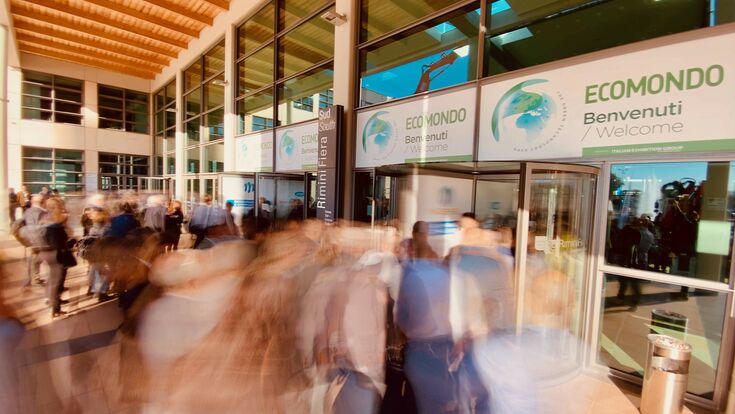Interview Ecomondo : Ecomondo's Alessandra Astolfi: "Essential event for the Industry"

Ms. Astolfi, can you tell us a little bit about Ecomondo and your role in a cleaner, healthier planet?
Ecomondo, which Italian Exhibition Group will be holding this year from 26thto 29th October, in physical attendance, is the most important green economy trade show event for the entire Mediterranean area, starting from Italy, southern Europe and as far as the African countries along its coasts. Furthermore, this year we will be looking closely at Eastern Europe. For 24 years, the show has grown both in terms of market and in institutional relations. Nowadays, Ecomondo is an essential event for the industry which is engaged in changing to a sustainable and inclusive bio-economy model, as well as for the civic and business associations committed to disseminating and monitoring the culture of circularity and sustainability. Lastly, it is a fundamental event for the market to speak with local administrations and so on, as well as European institutions, about the public policies that indicate milestones and the final objective of this new model that Ecomondo has been interpreting for many years. We can say that we were the forerunners and that we represent an obligatory moment for those who really care about the health of Europe, the Mediterranean basin and the world.
What are your ambitions for the upcoming years in terms of promoting the circular economy?
Ecomondo’s strong point lies in its solid relationship with Italian and European scientific and governmental institutions. Last year, the pandemic obliged international attention to focus on numerous workshops carried out in digital format. The backdrop to our key themes was the Green Deal drawn up by the European Commission at the end of 2019. The stages that would have accompanied the development of the Green Economy in Europe from here to 2030 have now been speeded up by EU’s Next Generation fund. The key message, therefore, was that, without sustainability, there would be no economic growth. The message is even stronger today. Without sustainability there will be no healthy environment in which to live and prosper. Therefore, our aim is to play a role in the most ambitious change that industrialized countries can manage to create. The institutions plot the route, industry offers the technological solutions, administrations apply the quality of life for all of us and the environment in their territories.
What do you think is the biggest challenge facing the waste and resource industry today?
What our exhibitors and speakers participating on our panels indicate is that the challenge, rather than technological, is cultural. It is a process that should be assisted on many levels starting from communication and the ethical commitment that the companies themselves are pursuing. Consumers reward corporate responsibility; the use of recycled raw materials is virtuously becoming more and more widespread and in increasingly wider fields of application. The markets reward ESG. These changes do not only concern company balances, they are part of our daily behaviour.
Where do you see the major market opportunities for the waste and resource industry?
If we look at the Green Growth Index data for 2020, we can see a progressive improvement in sustainability indexes in geographical areas such as China and the Far East in general which offer growth opportunities in these decisive sectors. China’s commitment to achieve “carbon neutrality” in 2060 is certainly encouraging, even for the markets.
Can you tell us a little bit about the Digital Green Weeks and how our readers can get involved?
The Digital Green Weeks are a kind of road map towards Ecomondo’s physically attended edition in October. They allow us to gradually assess the show’s “pillar” topics with our community of reference. The speed with which the pandemic produced imbalances must be compensated by a just as rapid map of the commitments that the institutions and industry are pursuing in order to change course. In this way, all the stakeholders at our show can be brought up to date and know, from the voice of the institutions and companies themselves, what they can expect to find at Ecomondo. Of course, this applies to the workshops. The technologies and companies are to be met, physically, at the show. But we are extremely confident that matching between professional operators will give optimal results. ISWA readers can follow the Digital Green Weeks by carrying out a few simple registration steps, also in English, and login to Ecomondo’s website.
Why should readers join Ecomondo this October and what are the opportunities you can help create?
Digital technologies have proved to be highly important in keeping professional contacts alive over the past 15 months but trade shows should be experienced live. We will be able to meet thanks to the progress of vaccination campaigns, the introduction of the European Green Pass and the protocols that Italian Exhibition Group drew up last year and is now perfecting for physically coming to the Expo Centre. We are preparing a benefit package for foreign operators. There will be many opportunities: technologies for land reclamation and protection, bio-diversity, waste recycling, water treatment, to name the most prominent. Furthermore, Ecomondo’s calendar includes the “A roadmap towards sustainable waste management practices worldwide” conference, organized together with ISWA, which will also see your President, Carlos Silva Filho, taking part to celebrate six years of the “Global Waste Management Outlook” book, which, for the first time, offered the international community an overview of waste management.
What were your main motivations for joining ISWA?
We are in increasing need of professionalism and the ability to network. ISWA, from this point of view, is an extremely important element that joins the institutional stakeholders with which Ecomondo has grown over the years. One only has to think about packaging recycling or Italian utility representatives that operate in the waste management sector. It is the core from which Ecomondo started a quarter of a century ago, so: thank you ISWA.
